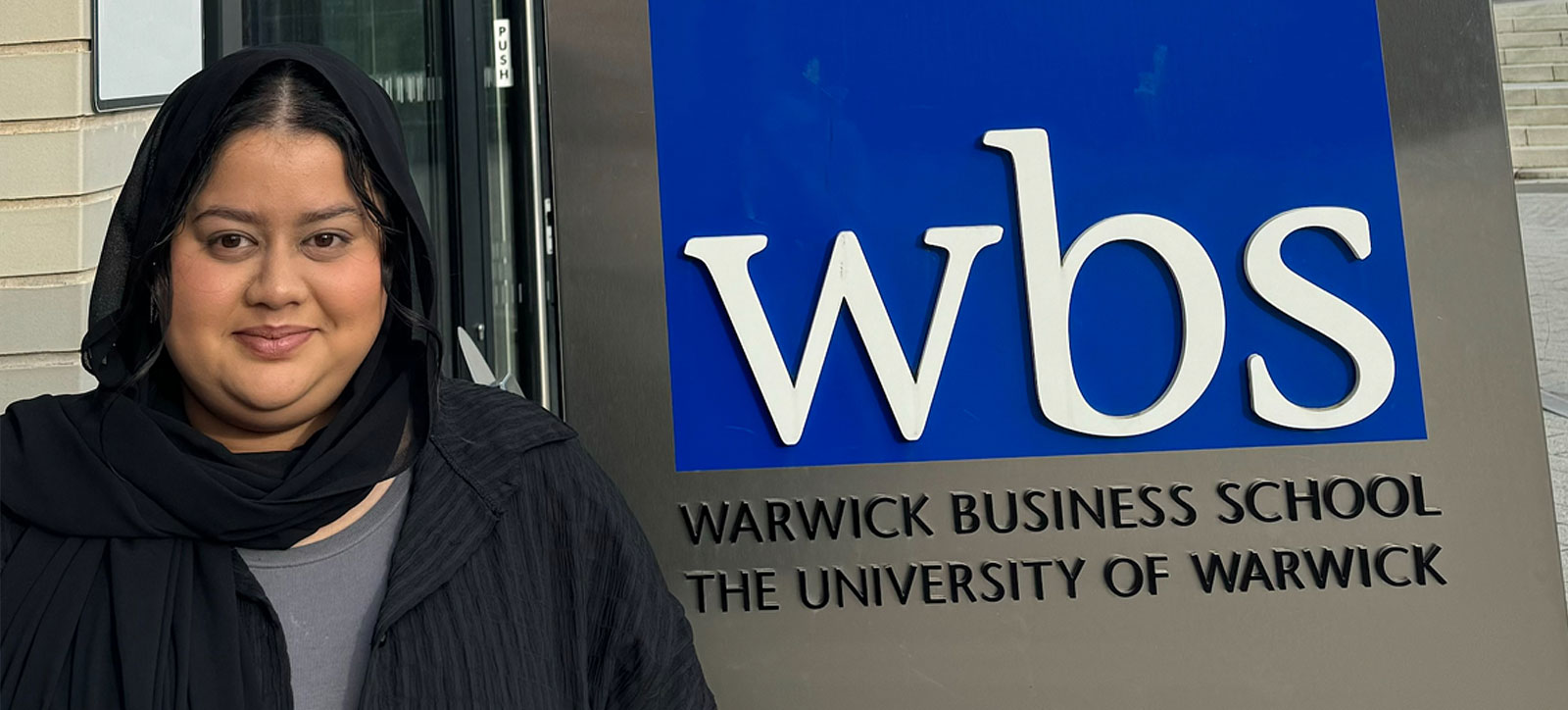
Application: Najeyah Ahmed is transferring skills she has learnt on the Foundation Year to her fundraising
In a lush, green corner of Bangladesh is a small plot of land which, if a Warwick Business School undergraduate has her way, will one day be home to a women’s health clinic.
“It all came about after a visit to see family back in Sylhet in 2019,” says Najeyah Ahmed. “It was then that I witnessed for myself the lack of healthcare facilities for young mothers in the area and became determined to do something about it.”
Four years later she was presenting her plan of action to a classroom of fellow students on the WBS Foundation Year.
Najeyah joined the BSc Accounting & Finance with Foundation Year programme last September after spending a gap year working for the Lloyds Banking Group in her hometown of Birmingham, and very soon she was thinking about how she could apply her learning back to that plot of land in Sylhet.
“We were learning about vision statements, performance objectives, marketing and all those sorts of things in the Foundations of Business module, and I was thinking ‘I can apply all these disciplines to a charity'," she says.
Although a charity dedicated to the building of the women’s clinic in Sylhet in north-eastern Bangladesh was originally the idea of her father, who has forged partnerships with a local hospital, Najeyah was now beginning to see clearly how she could contribute to it.
Firstly, she could help to build a community of stakeholders in and around her new-found contacts at the University of Warwick, for example through fundraising events.
Secondly, she might be able to leverage Warwick Medical School, encouraging students involved in clinical practice to volunteer some of their time to health education in Bangladesh, perhaps through one of Warwick’s international volunteering schemes.
Promoting health education
While her father is dealing with the bricks and mortar – finding architects to draw up plans for the health centre and raising money for its construction – Najeyah sees herself very much on the health education side of things.
“Seeing pregnant girls as young as 11 on that visit to Sylhet in 2019 was a big culture shock,” she says. “With a lack of formal education, or sex education, their only option is often just to get married and have children.
“They will then end up giving birth at home just with the help of a local village lady and with very little hygiene. This leaves them susceptible to infection and further ill-health.
“There have also been frequent reports of them being subjected to ‘emergency caesareans’ that they often don’t need and can’t afford.”
Hence, Najeyah is planning a two-month return to Sylhet this summer to start a fledgling education programme. She will be accompanied by her younger sister who plans to study medicine at university.
In the short-term, this will be about setting up informal classes in village homes to spread messages about the use of sanitary products and choices around childbirth. In the longer-term, though, Najeyah would like to see free classes attached to the newly-built clinic and formal training of local midwives.
“There will undoubtedly be some language and cultural barriers this summer but I think it’s important to start having the conversation,” Najeyah says.
In the meantime, she will be hard at work promoting the cause. Balancing her WBS programme with part-time employment with Lloyds, which is very supportive of her studies, she also has her sights on a marketing campaign for her Sylhet-focused social enterprise.
“This will be a kind of soft fundraising launch next month coinciding with Ramadan, which is a time when people are more willing to give gifts,” she says.
In addition to fundraising, she hopes to attract sponsorship from organisations such as banks and building societies.
The Foundation Year at Warwick Business School is offered on a full scholarship basis to promising students who may face barriers to higher education




 X
X Facebook
Facebook LinkedIn
LinkedIn YouTube
YouTube Instagram
Instagram Tiktok
Tiktok